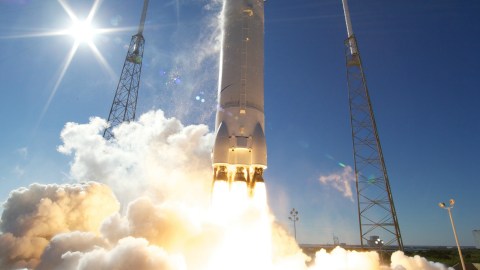A Great Leap for Capitalism: SpaceX Eyes Historic Launch, and Eventually Mars

Elon Musk is going to Mars. With or without NASA.
Of course, the ambitious former PayPal entrepreneur who founded SpaceX in 2002 has to take one step at a time. A very important first step, indeed a milestone, will happen this Saturday, May 19 at 4:55 a.m, when the SpaceX Dragon is scheduled to make a demonstration launch as part of SpaceX’s contract with NASA to launch cargo to the International Space Station.
No humans will be launched into space on this mission. That is the next phase in the for-profit space race in which celebrities like Ashton Kutcher, Bratt Pitt and Angelina Jolie will get to take Virgin Galactic’s “suborbital joy rides.”
What’s the Big Idea?
As Elon Musk recently told The New York Times, a suborbital adventure or even the two hundred mile trip to the International Space Station represent baby steps compared to a trip to Mars, which is millions of miles away. However, the price improvement curve is heading in the right direction. Currently the Russians charge NASA $60 million a seat to get an astronaut to the space station. SpaceX is looking to cut that cost to one-third, or $20 million. And Musk is even dreaming much bigger than that, predicting (or calculating, as he puts it) that within a decade or so after the initial trip to Mars — in which NASA may or may not be the client — the price tag would be $500,000.
While some critics, notably the astrophysicist Neil deGrasse Tyson, have said this is the stuff of fantasy, Elon Musk has a great track record for predicting where technology is going, and where opportunities will arise in different industries, including space.
How does Musk spot these opportunities?
Watch the video here:
What’s the Significance?
As we look at the evolution of the space industry, the major funding is coming from governments and private companies financed by billionaires (the space mining company Planetary Resources is another prime example).
And so the question remains, who will lead? Currently the private space companies like SpaceX are feasting off government contracts. And yet, continued funding in Congress is anything but a sure bet. That is why entrepreneurs like Musk realize the NASA gravvy train is not a likely way to get to Mars, at least anytime soon. That is why he has set out to do it by himself.
“I’m not going to try to convince people I can do it,” he told The Times. “I’m just going to do it.”
Image courtesy of SpaceX/Chris Thompson
Follow Daniel Honan on Twitter @Daniel Honan





